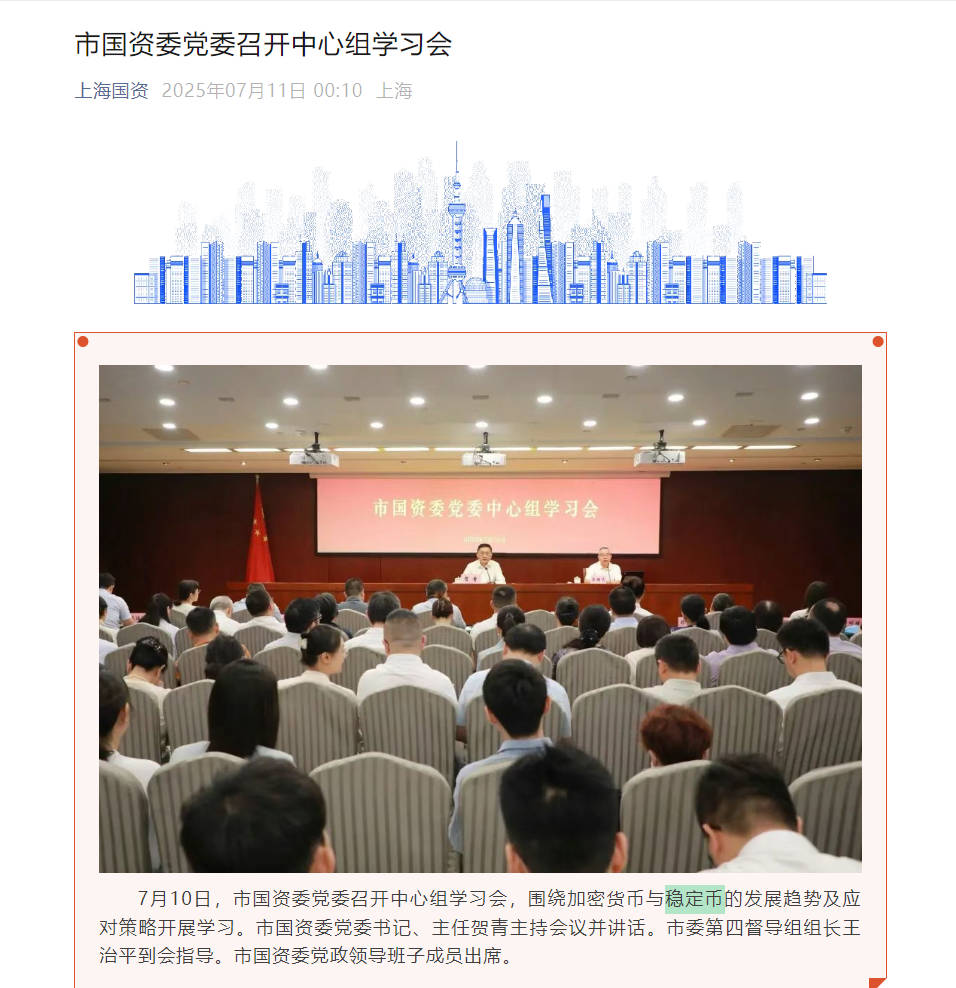
Author: Weilin, PANews
On July 11, the Party Committee of Shanghai State-owned Assets Supervision and Administration Commission held a central group study meeting on July 10 to study the development trends and response strategies of cryptocurrencies and stablecoins. Subsequently, A-share digital currencies and blockchain concept stocks continued to rise in the afternoon of July 11. Previously, Wuxi also held a special promotion meeting, mentioning "exploring the practical path of stablecoins to empower foreign trade development." This may be a response to the speech of Pan Gongsheng, governor of the central bank, at the 2025 Lujiazui Forum in June.
At the same time, at 1:46 pm on July 11, Bitcoin hit a new high. OKX market data showed that BTC broke through $118,000, setting a new record high of $118,050 per coin, with a daily increase of 5.96%.
Shanghai State-owned Assets Supervision and Administration Commission Party Committee: Study the development trend of cryptocurrencies and stablecoins
According to Jinshi, at the study meeting of the central group, He Qing, secretary of the Party Committee and director of the Shanghai State-owned Assets Supervision and Administration Commission, pointed out that it is necessary to fully implement the spirit of the Seventh Plenary Session of the 12th Municipal Party Committee, adhere to innovation-driven development, maintain a keen sense of emerging technologies, and strengthen research and exploration of digital currencies. Adhere to the integration of production and numbers, and explore the application of blockchain technology in cross-border trade, supply chain finance, asset digitization and other fields. Persist in hard work and improve the ability of strategic agility and strategic initiative, further promote the deep integration of science and technology, finance, and industry, better play the important role of state-owned assets and state-owned enterprises in scientific and technological innovation, industrial control, and security support, and make new and greater contributions to the construction of Shanghai's "five centers".

The Hong Kong Stablecoin Ordinance will come into effect on August 1 this year, when the Hong Kong Monetary Authority (HKMA) will begin accepting applications for licenses. Currently, the HKMA is consulting the market on the specific guidelines for implementing the ordinance and strives to formulate the guidelines as soon as possible.
On July 11, the concept of stablecoins in Hong Kong stocks surged in the early trading. Jinyong Investment (01328.HK) rose by more than 30%, and its market value exceeded HK$2.5 billion; Guotai Junan International (01788.HK) rose by more than 7%, OSL Group (00863.HK) rose by more than 5%, and China Everbright Holdings (00165.HK), Delin Holdings (01709.HK) and other stocks followed suit.
Subsequently, A-share digital currency and blockchain concept stocks continued to rise in the afternoon. Hengbao Co., Ltd., TP-Link Software, and China Science and Technology Finance hit the daily limit, while Sanwei Tiandi, Jida Zhengyuan, and Xinzhi Software were among the top gainers.
Influenced by the US stablecoin federal legislation Genius Act, the European MiCA compliance program and the Hong Kong Stablecoin Ordinance, the stablecoin compliance wave has expanded globally. The phenomenon of stablecoins "going out of the circle" has been going on for some time.
On July 4, the Wuxi Municipal Party Committee held a special meeting to promote key reform tasks. According to the official announcement, the meeting mentioned "exploring the practical path of using stablecoins to empower foreign trade development, continuously expanding the growth space for digital trade, green trade, and service trade, and improving the development level of cross-border e-commerce, intermediate product trade, and offshore trade . "
Recently, Fu Lao Investment, a subsidiary of Quanshi International, and the People's Government of Yanji City signed a memorandum of understanding on possible cooperation in digital economy-related business matters in Hong Kong, mentioning the design of a multilateral points exchange system for Yanji's cross-border tourism consumption scenarios. The tamper-proof nature of blockchain is used to ensure the transparency of points issuance, while bridging the points systems of merchants in China, South Korea and Russia through offshore RMB stablecoins. Consumers can exchange local consumption points for stablecoins and pay directly at overseas cooperative merchants. Adopting a "two-tier compliance framework", the bottom layer is issued by a Hong Kong licensed institution with a legal currency collateralized stablecoin to ensure the compliance of funds; swap transactions are designated by the Yanji government, which can open up international blockchains.
Think tank suggestion: The development of RMB stablecoin can be "internal and external integration"
The stablecoin exploration in Shanghai and Wuxi, both located in the Yangtze River Delta region, may be a response to the speech delivered by Pan Gongsheng, governor of the central bank, at the 2025 Lujiazui Forum in June this year.
On June 18, Pan Gongsheng, governor of the central bank, said at the 2025 Lujiazui Forum that new technologies are accelerating their application in the field of cross-border payments. New technologies such as blockchain and distributed ledgers have promoted the vigorous development of the central bank's digital currency stablecoin, realizing the reshaping of the traditional payment system from the bottom up in terms of payment and settlement, greatly shortening the chain of cross-border payments, and at the same time posing huge challenges to financial supervision. Technologies such as smart contracts and decentralized finance will also continue to promote the evolution and development of the cross-border payment system. In addition, Pan Gongsheng also proposed to carry out a pilot project for comprehensive reform of offshore trade financial services in the Lingang New Area of Shanghai. Innovate business rules to support Shanghai in developing offshore trade.
The rapid development of stablecoins has attracted suggestions from think tanks. On July 10, Yang Tao, deputy director of the National Financial and Development Laboratory, wrote an article suggesting that the development of RMB stablecoins should adopt a "domestic offshore + overseas offshore" linkage model, coordinating the pilot exploration of the domestic Shanghai Free Trade Zone and the overseas Hong Kong market. The article pointed out that the current RMB stablecoin should be led by central supervision, build a wholesale and retail combination, and an on-chain issuance mechanism, and achieve "electronic fence" compliance through technical means. He also suggested the establishment of a dual currency system of CNYC (domestic offshore RMB stablecoin) and CNHC (offshore offshore RMB stablecoin) to support cross-border payments, RWA settlement and RMB internationalization, emphasizing that risks should be strictly controlled and the construction of a legal framework should be accelerated.
Shenzhen and Beijing: Beware of illegal fundraising in the name of stablecoins
However, the "out-of-circle" effect of stablecoins has also triggered more market risk alerts and reflections. Recently, Xinhuanet International Highlights connected with Liu Ying, a researcher at the Chongyang Institute for Financial Studies at Renmin University of China, to interpret the development of stablecoins. The article mentioned that "in recent years, stablecoins have entered a stage of rapid growth, attracting widespread attention from international public opinion, and many well-known companies and institutions have accelerated their layout of the stablecoin market." The article then interpreted the characteristics, functions, application scenarios and issuers of stablecoins.
On July 7, the illegal platform "Xinkangjia" disguised as a stable currency collapsed. According to the report of the Taojiang County Public Security Bureau of Hunan Province, some people invested through the "DGCX Xinkangjia" platform under the recommendation of others. The platform used the name of Dubai Gold and Commodities Exchange (DGCX) to attract funds. It is actually an unauthorized and unqualified illegal platform that promises high returns and induces spread by developing members and rebates. Since June 25, the platform has been unable to withdraw cash normally, and it is suspected that the capital chain has been broken, posing a large risk of fund-raising fraud. The public security organs remind people not to participate in such unapproved platform investments.
On July 7, the Shenzhen Municipal Task Force Office for Preventing and Combating Illegal Financial Activities also issued a "Risk Warning on Illegal Fund Raising in the Name of Stablecoins, etc." The office said that recently, digital currencies represented by stablecoins have received widespread attention from the market. Monitoring found that some illegal institutions use "financial innovation" and "digital assets" as gimmicks, take advantage of the public's lack of understanding of stablecoins, etc., and absorb funds by issuing so-called "virtual currencies", "virtual assets", "digital assets", etc., induce the public to participate in trading speculation, disrupt the economic and financial order, and breed illegal fundraising, gambling, fraud, pyramid schemes, money laundering and other illegal and criminal activities, seriously endangering the property safety of the public.
On July 9, the Beijing Internet Finance Industry Association also issued a risk warning, warning against illegal institutions and individuals using digital currency concepts such as "stablecoins" to illegally raise funds. Related activities induce public investment through false promises of high returns and fund pool operations, and there are problems such as lack of qualifications, concept packaging, and risk spillover. Once the capital chain is broken, investors may face huge losses.
In general, with the accelerated exploration of stablecoin applications in Shanghai, Wuxi and other places, the application prospects of digital currency and blockchain technology in China are gradually emerging. However, in this innovative field, we also need to be vigilant about the potential risks and take effective regulatory measures to ensure the healthy development of the market.







